Are French Bulldogs Good for Families?

Calm and good-natured French bulldogs are created for family life, as they get along well with other pets and children of any age. They hardly make a sound, so they are suitable for living in an apartment. In this article, we will consider tips on how to care for a French bulldog, a puppy and an adult dog, the features of keeping and feeding, and care tips.
Are French Bulldogs Good
Breed characteristics
The main feature of the French Bulldog is the brachycephalic structure of the skull, that is, a flattened muzzle with a short nose. Therefore, representatives of the breed may have difficulty breathing, poorly tolerate physical activity, snore in their sleep and breathe noisily. For this reason, caring for a French Bulldog will require special attention to environmental conditions – these dogs cannot be in stuffy rooms, outside in the heat or cold.
French Bulldogs are generally calm and friendly dogs, but they can also be quite active. Because they have a fairly docile nature, they are suitable for first-time owners.
Readiness to get a dog
Before a new family member appears in your home, it is worth considering: few owners at the first stage realize that a dog is a responsibility associated not only with joy, but also with troubles. The scope of these concerns should not be underestimated, since the lack of daily communication, games, eye contact with the pet and regular training can lead to a deterioration in mutual understanding between the dog and the owner.
And this, in turn, can manifest itself in destructive behavior of the pet. If you often stay late at work, feel tired and overloaded, you should not get a puppy, because it will require your attention, time and energy for walks, care and interaction.
Before getting a dog, the owner should be prepared for the fact that:
- The daily rhythm and schedule will be disrupted and will need to be rebuilt to suit the dog’s needs.
- Keeping a French Bulldog requires material costs – from choosing the right food to mandatory disease prevention in a veterinary clinic.
- The pet needs time and attention: French bulldogs do not tolerate loneliness well, they need communication and activities, daily walks.
- You need to prepare yourself for the fact that you will have to clean more often.
- If a child asks for a pet, it is important to understand that the French bulldog will still have to be looked after by adults – most likely, this will be a person with a stable work schedule who can walk the dog in the morning and evening.
But those who consciously decided to get a French bulldog and are ready for possible difficulties, will find a loyal and affectionate friend.
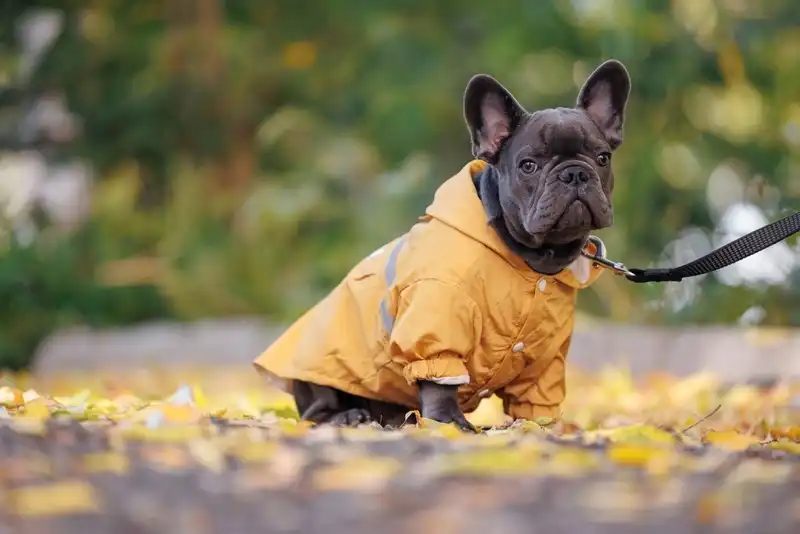
Recommended Shopping List for a Bulldog
The dog will need its own items, such as food and water bowls. Ceramic, stainless steel, or thick glass are best.
But this is far from all that is worth purchasing for comfortable living with a pet in the house:
- Harness with a leash. And also a carrier for transporting the puppy from the breeder home. It is also worth putting a collar on the dog with the owner’s address and phone number. An adult bulldog needs a stronger, more reliable collar or harness.
- Bags. For cleaning up excrement during walks.
- Clothes for walks in winter and in the off-season. Bulldogs do not have an undercoat, so even at +10°C the pet can freeze and need protective clothing, especially if the weather is windy or rainy.
- A bedding bed or a basket with a pillow. The place for sleeping and resting should be the size of the dog, made of durable and “breathable” fabrics, with removable covers and the ability to wash. The bed should be located in a quiet and secluded (not a walk-through) place of the apartment or house, where sleep will be deep and calm.
- Toys. Bones, medium-sized rubber balls so that the dog does not eat them, cannot chew and swallow pieces of rubber, wood, etc.
- Muzzle. Required for the growth period (small size) and for adult bulldogs. It is necessary to use a muzzle during walks in public places and travel by transport, as well as during procedures at the veterinarian.
- Boots. These are necessary if you and your pet walk on city roads sprinkled with salt or snow-melting reagents in winter: these substances damage the skin on the bulldog’s paw pads. Shoes will protect against such damage and provide better hygiene of the interdigital space and paw pads, which is important for dogs with sensitive skin.
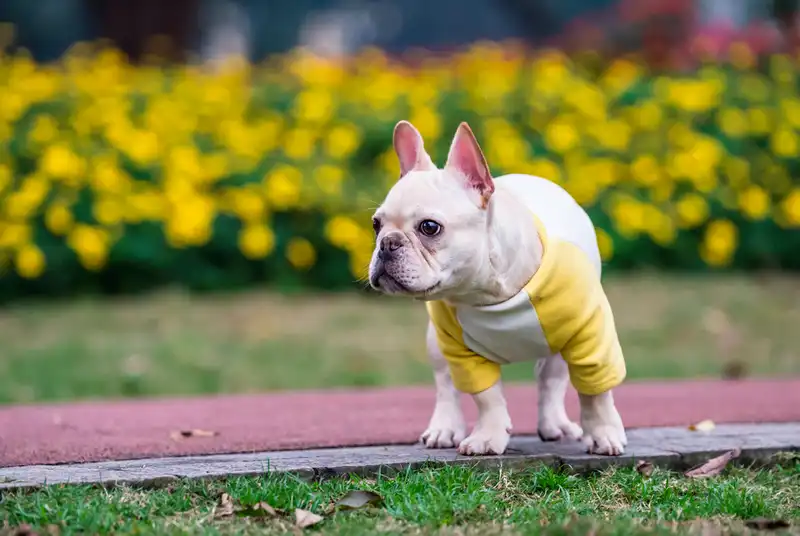
Are French Bulldogs Good
First steps when a new pet appears in the house
The first few days the puppy gets used to the new place: adaptation is often accompanied by stress, so the pet can whine at night, be afraid of new people, unfamiliar interior items, working household appliances.
During this period, each family member can look after the French bulldog, take patronage over it, help it get used to the new place with affection and attention. At the same time, it is advisable to avoid noise, screams that will scare the puppy, as well as obsessive attention. Still, it is worth allowing the puppy to explore the house on its own, but accompany it and make sure that the pet is safe.
At first, it is better to maintain the same sleep and feeding regime that the breeder had.
To do this, it is worth talking about this with the seller, and also asking for some of the puppy’s things, for example, a bed, so that the familiar smell will help the pet adapt faster.
Explain to children that the French bulldog, despite its good nature and readiness for constant games, is still a dog that gets tired, may not be inclined to play, and needs privacy. Do not disturb the pet during meals, sleep, make it uncomfortable, or test its patience. Adults should not leave small children alone with a dog. The same is true for the bulldog’s interaction with other small animals – rats, rabbits, parrots.
Preparing a place for a dog
It is better to place the bed in a light and quiet place where nothing will disturb the dog’s sleep. It is not recommended to place the bed near the radiator, and the dog should not sleep in a draft, near the door or in a cold room.
The first thing you should do is to accustom the puppy to its place. You can point to the bed, say “Place”, put the pet down, invite it by patting it with your hand.
The home should be a safe environment: do not leave dirty shoes in the dog’s reach – the puppy can ruin them, and there is a high risk of infection. It is important to remove small objects, especially those with many parts or sharp edges, so that the puppy cannot swallow them or get hurt while playing. Electrical wires should be inaccessible to the dog.
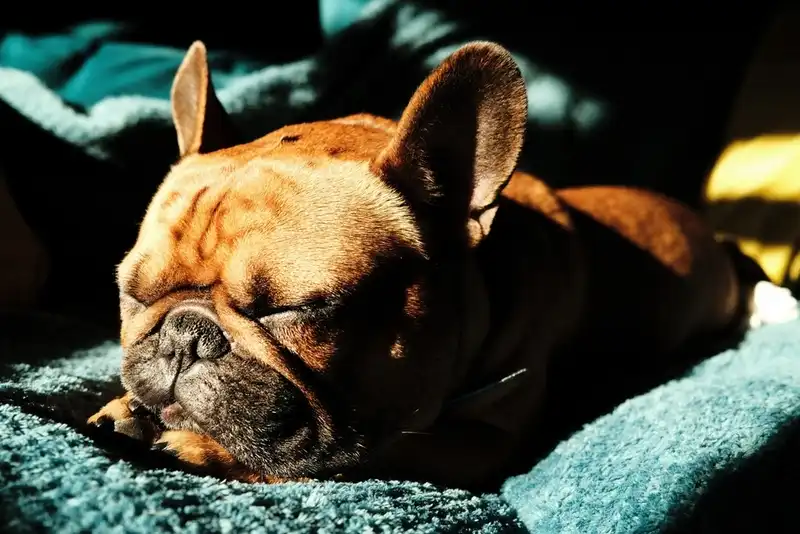
How to care for a French Bulldog puppy?
During the first 12 months of life, the puppy grows. Its digestive, skeletal, muscular, and immune systems are formed, and its character is laid. All the rules of care and hygiene procedures described in the article are relevant for puppies. Below we will tell you about age-related nuances and stages – how to care for a French bulldog in the first 12 months.
1 month
During the first month of life, the puppy sleeps a lot: a long break for sleep is important for growth and development. Therefore, it is necessary for the pet to have a warm and quiet place to rest, where no one will disturb it. During this period, the mother feeds the puppies – up to 6-8 times a day. The nursing bitch must have comfortable conditions – a convenient place to rest, suitable food.
At this age, it is important to carefully look after the French Bulldog and monitor the puppy’s condition: at the slightest deviation from the norm, you must immediately contact a veterinarian.

2-3 months
Around 2 months of age, the puppy moves to a new home. This is the time of adaptation, getting to know the family and other pets. Also at this age, the stage of active socialization of the puppy begins. Active and curious, babies show interest in people and animals, strive to play with everyone. Little by little, you need to introduce your pet to new people and objects.
Care at the age of 2-3 months also includes the first vaccination and revaccination. Around 3-4 months, the full course of vaccinations is completed, and after quarantine, the pet can be taken outside. By this time, it is worth accustoming the puppy to a harness and leash, so that when you start walking, he is already ready to wear equipment .
4-12 months
By 4 months, it is important to start paying attention to the upbringing and formation of habits of the pet. They begin training and training – if you have little experience in raising dogs, you can contact a dog trainer who will help establish a relationship with the animal.
From about 4 to 6-7 months, puppies begin to change their milk teeth. To ease the pain and reduce the time of discomfort, give your pet chew toys – rubber balls, dental massage bones for medium-sized puppies, which help to change milk teeth more quickly.
Caring for a French Bulldog involves possible castration, which can be done as early as 6-7 months.
Diet
For a French bulldog, it is better to choose food created for representatives of this breed, or diets for medium-sized dogs (possibly for sensitive digestion). Granules adapted in size, shape, texture and density will be much more liked by the pet and will stimulate chewing of food, which has a positive effect on oral hygiene and digestion.
You can also consult with a breeder, veterinarian, or pet store specialist about food recipes that take into account the needs of the breed and have a kibble shape that is more convenient for their jaws to grasp.
The diet will differ depending on age:
from 1 to 2 months a “starter” diet for the weaning period will be required;
from 2 to 12 months – diet for French bulldog puppies or medium breed puppies (“Medium”);
From 12 months, you need a diet for adult French Bulldogs or medium-sized dogs (marked “Adult”).
Organization of hygiene
Basic care should start at 2-3 months so that the pet gets used to hygiene procedures and perceives them as a routine, without getting nervous or resisting. From an early age, you need to accustom the pet to brushing teeth, eyes and ears, trimming claws . Teach the dog to calmly react to touching any part of the body.
How to care for a French Bulldog’s coat?
French bulldogs have short hair, which makes all the necessary procedures much easier. Their coat needs to be combed with soft brushes or a special fleecy glove that does not hurt the dog’s delicate skin. Periodically, you can wipe the coat with a damp cloth to care for the coat. In spring and autumn, during shedding, you need to groom a French bulldog every day, the rest of the time – once every 5-7 days.
Washing
French bulldogs have a large number of skin folds that need to be wiped with a dry, clean and soft cloth – this will protect against diaper rash and inflammation. You should bathe a bulldog only as needed, usually after walking through dirty puddles or swimming in open water. For washing, use shampoos for short-haired dogs. After washing, blot the fur with a towel and keep your pet warm until it is completely dry. You can speed up drying with a hair dryer, but use only the cold mode.
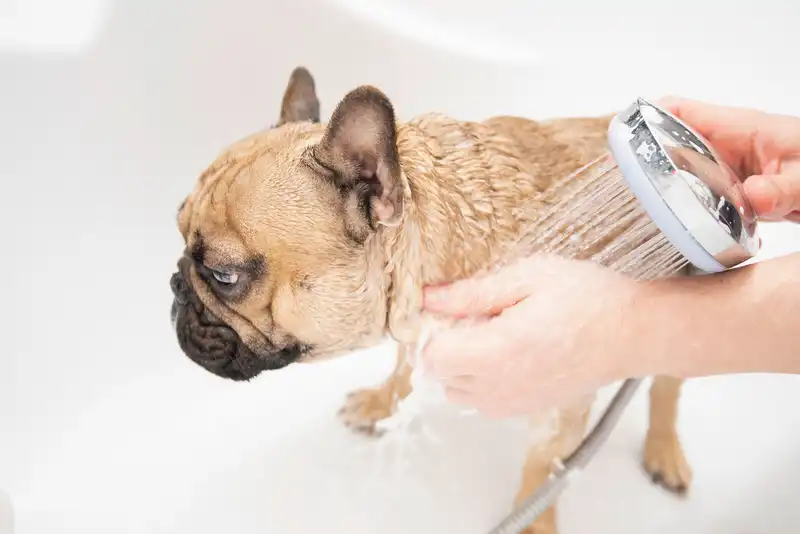
Ears and eyes
Grooming a French Bulldog should include special attention to the eyes and ears. The ears should be cleaned once a week with a cotton swab soaked in ear lotion for animals.
As accumulations form in the corners of the eyes, they should be treated with a clean cotton pad soaked in warm boiled water. If the discharge from the eyes is abundant and redness is observed, then you should contact a veterinarian.
Teeth
They need to be cleaned regularly with veterinary paste and a brush with medium-sized bristles adapted for individuals or a finger brush. Usually, there is no need to remove the paste for animals after cleaning, which is how it differs from the product for people. Regular cleaning will protect the dog from developing oral diseases. Dry granules of food will also help maintain oral hygiene.
Claws
These dogs need their nails trimmed approximately every 3-4 weeks. If the pet walks on a hard surface (asphalt) enough, the nails wear down naturally and need to be trimmed less often.
If you plan to trim the nails yourself, you should learn how to do it so as not to damage the blood vessel – this causes bleeding and can provoke inflammation. If the dog has white nails, then the blood vessel is usually indicated by a pinkish vein, but sometimes the boundaries of the nail bed are unclear to the owner without experience. Ask the breeder or veterinarian at a routine appointment to teach you the technique of trimming the nails.
Why does French Bulldog grooming include mandatory nail trimming? If they grow too long, the dog will feel uncomfortable walking, shifting weight from the toes to the pads of the paws, changing the position of the limbs and putting stress on the joints. If this becomes a habit, it can lead to problems with the spine.
Toilet training
In the first months of life, the puppy is not able to hold back the urge to urinate for a long time, so you should be prepared for puddles on the floor. After six months, the puppy already understands that the toilet is done during a walk, but there may still be “misfires” in the period from about 6 to 10 months. Therefore, it is recommended to accustom the puppy to a diaper or take it outside more often.
To train your dog to use the toilet, you should follow the rules:
- The first thing you do after a nap is take the puppy out for a walk. After he has done his business, praise him.
- It is worth placing diapers around the house, which will serve as a toilet for the pet during the growing period.
- Do not punish the puppy for mistakes – self-regulation is poorly developed due to age, and it is formed not from censure, but by itself as it grows up.
- Watch the puppy, try to understand when it wants to go to the toilet. For example, dogs can look out the window, circle the door, worry, approach the owner. In this case, take the pet outside.
The Importance of Vaccination
The development of most serious infectious diseases is prevented by vaccinations – for example, against plague and rabies . Therefore, vaccination is an obligatory part of caring for a French bulldog. The first vaccination is given at 8-12 weeks, but the exact schedule is determined by the veterinarian, taking into account the health of the pet. For example, vaccination cannot be carried out during illness, the change of baby teeth, etc.
Sterilization and castration: pros and cons
Castration of a pet solves a number of serious problems. For example, it prevents some diseases of the genitourinary system, and also eliminates most behavioral difficulties: urinating on the bed, marking, unmotivated aggression towards individuals of the same sex. And, of course, it eliminates the risk of unplanned reproduction.
Disadvantages of castration:
- Increased risk of developing urolithiasis with obesity. This is corrected by nutrition and sufficient activity.
- There are risks of anesthesia, as with any surgery. Therefore, it is necessary to choose a well-equipped and staffed veterinary clinic with specialized specialists, where both surgical and anesthetic teams work. Before the operation, perform a cardiac check as recommended by the veterinarian.
The age when it is best to perform castration will be determined by a veterinarian; it is usually performed between 7 months and 1 year.
How often should you walk your pet?
French bulldogs do not require serious physical exercise – 2 walks of half an hour each are enough. However, this is not a “couch breed”. Dogs prefer leisurely walks, but are quite hardy and love to walk long distances. They may have difficulty breathing and thermoregulating, so you cannot walk this dog in extreme heat and frost. In summer and spring – it is better to walk early in the morning or late in the evening. On a hot day, you need to cool the dog with a towel soaked in cool, but not cold water, regularly give it something to drink.
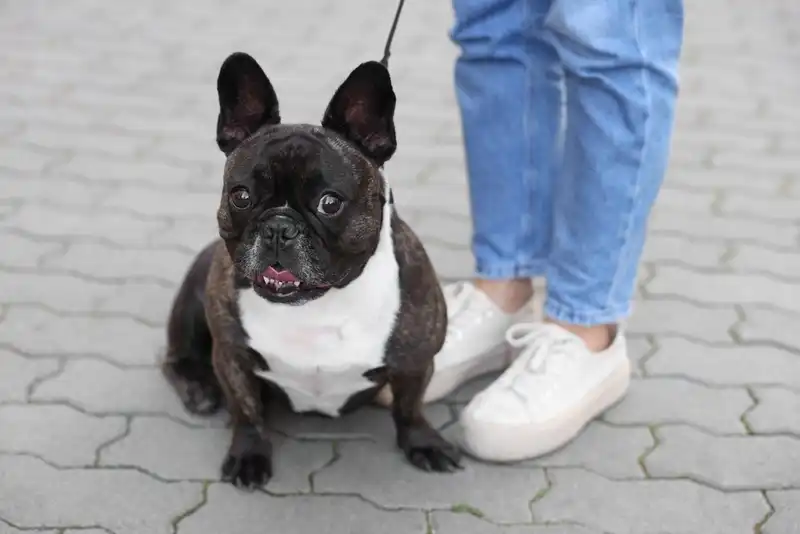
Tips on education and training
French Bulldogs require basic training, especially if they are going to live with children or other pets.
Starting from 2 months, you can begin to learn the basics of training and education:
- Get used to being handled – the puppy should allow itself to be picked up, examined, combed, have its ears and teeth cleaned, and get used to basic procedures.
- Teach basic commands: “Place”, “Walk”, “Come”, “No”.
- Get used to friendly contacts: walk with other dogs and their owners.
Remember that puppies, like people, are reluctant to perform boring and complex tasks, quickly get tired of concentrating, and are prone to frustration when overly demanding: if something does not work out quickly enough, they lose interest. For the owner, such behavior may seem like stubbornness and inability to learn, although the reason is the pet’s loss of interest. Therefore, when training a dog, be sure to use positive reinforcement, praise, and reward, even if the success is insignificant and far from expected.
Diseases and their prevention
The most common health problems in French Bulldogs are related to the structure of their body and, first of all, the skull.
The main diseases include the following:
- Heavy breathing.Difficulty breathing and snoring during sleep are considered normal, but if the syndrome worsens, you should consult a doctor. For prevention, you should avoid excessive physical activity.
- Difficult thermoregulation.In summer, there is a high risk of heat stroke, and in winter – hypothermia, breathing problems can occur when the respiratory tract is exposed to cold air. Therefore, part of caring for a French bulldog is warm clothing in winter, cooling with a damp towel in summer, and avoiding walks in hot and cold weather.
- Skin diseases.To avoid them, you need to regularly wipe the folds of the skin and make sure there is no inflammation.
- Eye diseases.The bulldog’s bulging eyes, surrounded by folds of skin, can suffer from injuries. They are prone to inflammation, dryness, and therefore require daily care and routine examinations by a veterinary ophthalmologist.
Careful care of the French bulldog, proper nutrition prevent most diseases. Young animals should be taken to the veterinarian for an annual examination, and bulldogs over 8 years old – twice a year.
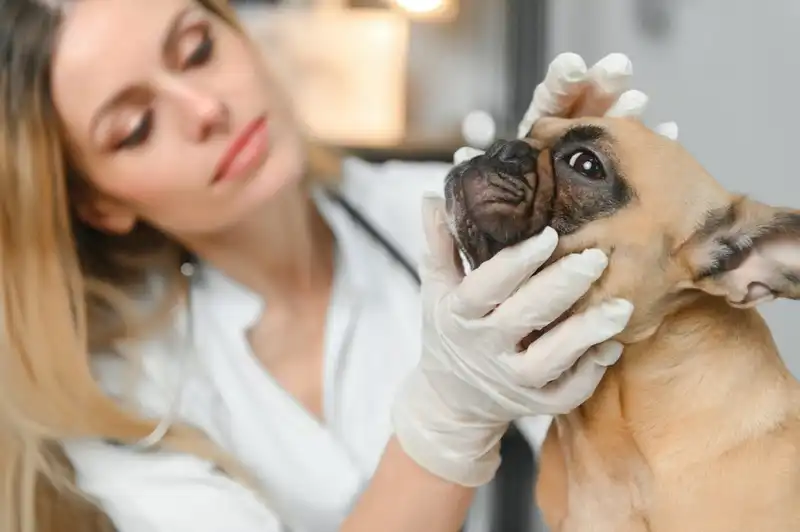
When might special care be needed?
Pregnancy, old age, special health conditions – there may be periods in the life of a pet when it requires increased attention and special care. Most often, changes concern nutrition , because this is the main factor in the well-being of the animal, but hygiene procedures may also have their own characteristics. Let’s consider some conditions.
Pregnancy
Pregnant bitches from the 42nd day of pregnancy need special nutrition – a diet for pregnant dogs or puppies up to 2 months. The frequency of feedings can be increased on the recommendation of a veterinarian.
It is better to reduce the duration of walks, but make them more frequent – sufficient exercise will only benefit a pregnant bitch. After 2 months after giving birth and if you feel well, you can return to the previous volume of physical activity.
Needs of Senior Dogs
When a French Bulldog reaches 8 years of age, it enters a period that can be called old age. At this time, hearing and vision may gradually deteriorate, and the gastrointestinal tract becomes more sensitive.
When caring for an older French Bulldog, you need to follow these guidelines:
- Calm atmosphere.
- Moderate, even exercise: the bulldog should not lie still for long periods of time, but should not run vigorously either.
- Monitoring breathing: As French Bulldogs age, breathing may become more difficult.
- Veterinary observation: A preventive clinical examination should be performed twice a year, including an assessment of cardiac function.
Obesity
French bulldogs are prone to gaining excess weight. The reasons may be an improper diet, a slow metabolism and lack of exercise. To normalize weight, a veterinarian prescribes specialized food – usually dietary rations for obesity or preventive ones for sterilized dogs or those prone to gaining weight. They contain a minimum of fat and an increased amount of easily digestible proteins. If possible, it is worth increasing the time spent walking in the fresh air.
French Bulldog Grooming Checklist
Before buying a dog, make sure that you and all family members are ready for such a responsible step. You should have enough time, energy and money for your pet.
- Keeping a French Bulldog will require the following purchases: a leash, a harness, a collar with an address, two heavy bowls for food and water, a bed, a carrier, toys.
- It is important to choose a puppy from a trusted breeder who knows the breed well, is passionate about dog breeding, and can provide you with the necessary informational support at the first stage.
- The dog’s bed should be in a quiet, warm place without drafts, not near the door or the radiator. Nothing should disturb or disturb sleep.
- You need to feed and walk your pet according to a set schedule. Up to 6 months, a puppy cannot hold it, so there will inevitably be puddles on the floor if you cannot walk it every 3-4 hours. The frequency of feeding decreases with age: at 1-2 months – 6 times, 2-4 months – 5 times, 4-7 months – 4 times, after 8 months – 2-3 times a day.
- Recommendations that will help you understand how to care for a French bulldog: trimming nails about once every 3 weeks, examining and cleaning ears and teeth, eye care, wiping skin folds with a clean, soft and dry cloth. The coat is combed with a lint mitt or a soft brush daily during shedding and once a week at other times.
- The Bulldog may be prone to respiratory, eye, skin problems, and obesity.
- Disease prevention: castration, annual veterinary examination and heart check, vaccinations from 8 weeks, selection of suitable food, sufficient physical activity.

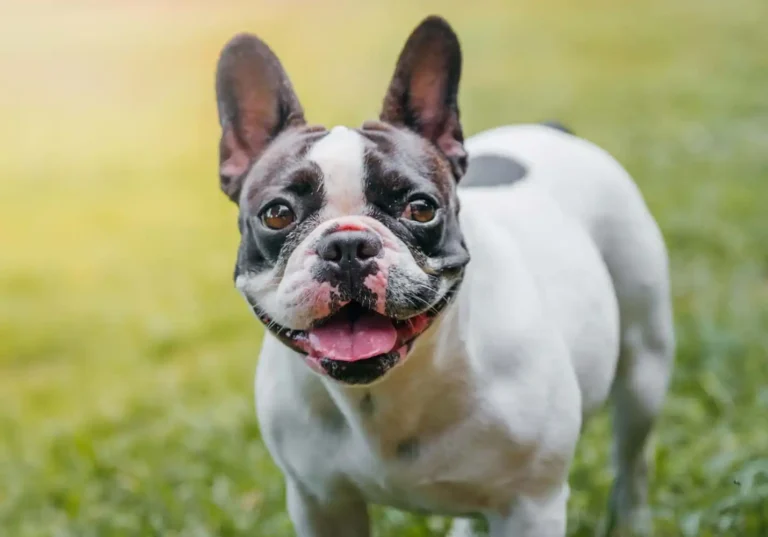

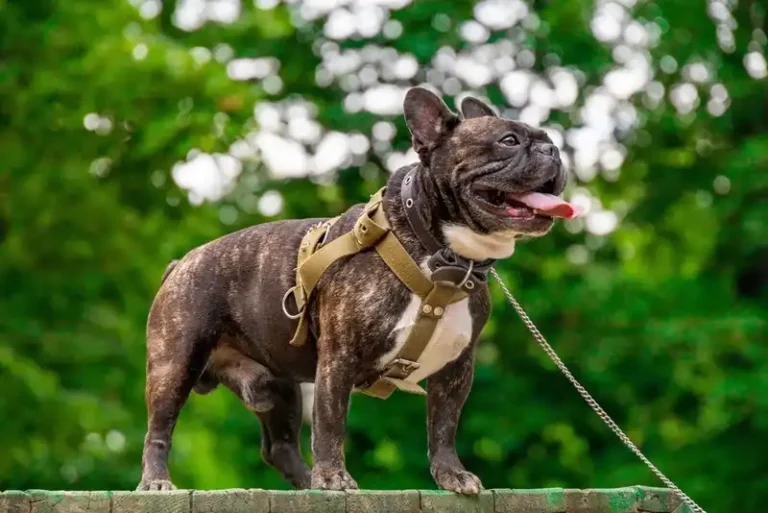
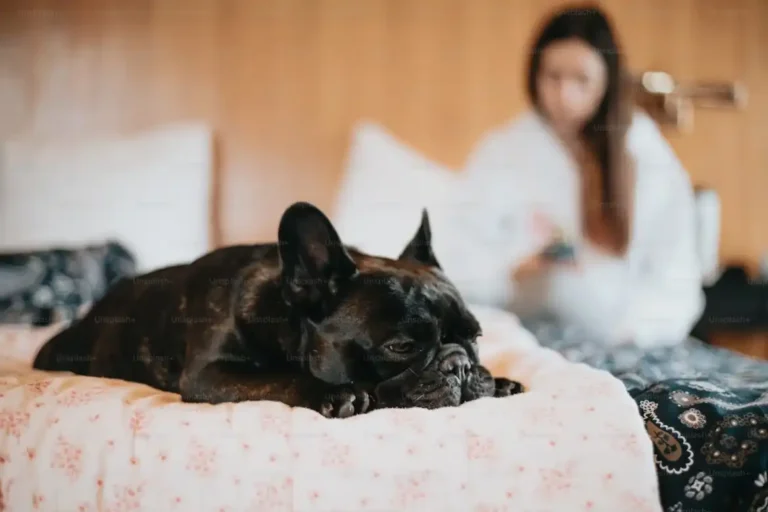
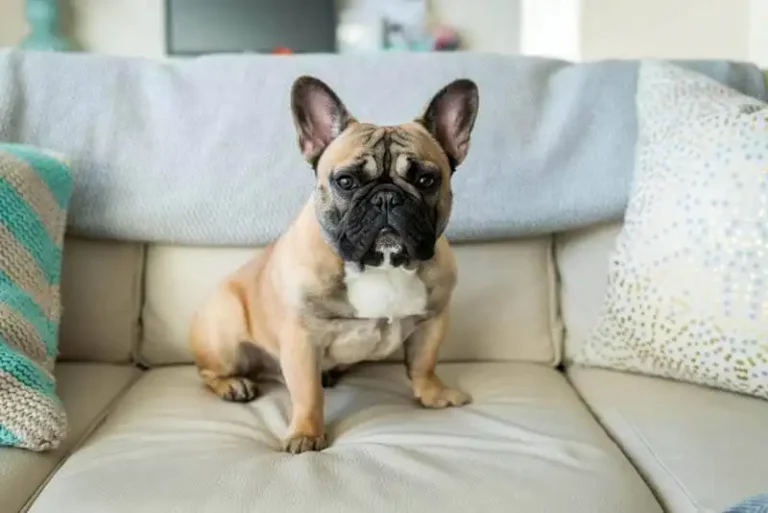
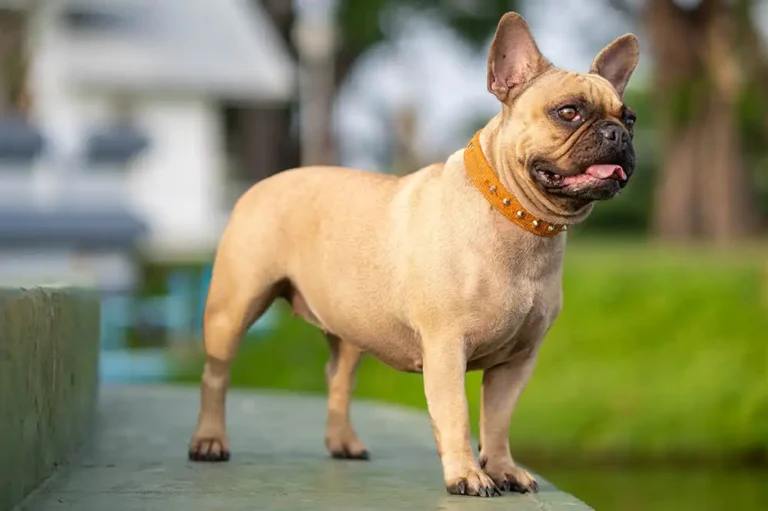
One Comment